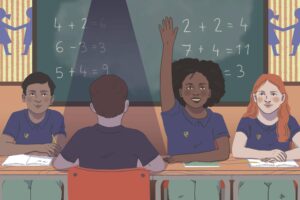
55 Narrative Fiction Writing Ideas for High School
22
It’s true — every student in your high school class is a writer, whether they know it or not! The key to accessing their inner author lies in the type of writing you assign, especially when it comes to the different genres of narrative fiction. From creative writing to fanfiction to screenplays, these narrative fiction writing ideas for high schoolers are sure to spark inspiration in even your most reluctant student writers.
Creative Writing Ideas for High School
Whether your high schoolers love creating fantasy worlds or dread creative high school writing prompts, these high school narrative writing ideas are a great way to ignite their imagination in your ELA class.
- Your character lives in a world where phones were never invented. How did humans learn to communicate, and why is their way of life being threatened?
- A bank robber tells you to get down and be quiet. The bigger problem is that you recognize them.
- Your main character has woken up with the power to read minds, and they’re about to see their crush.
- Start a story with the line “When I invented teleportation, I never expected…”
- One hundred years from now, humanity lives on a new planet. There are many wonderful things here, but also something terrible.
- Your phone’s ringing with a number you’ve never seen before. The only words they say are “Your parents are lying to you.” What happens next?
- Good news: You’ve found a time machine! Bad news: Someone’s just arrived from another time, and they look terrified.
- In your character’s family, they get a new superpower on their 16th birthday. What is the power, and how do different members of the family handle it?
- Write a short story from the perspective of something in the classroom. What does it worry about? Who are its friends?
- Your character doesn’t believe in ghosts. They’re about to change their beliefs, thanks to the ghost that just appeared in their room.
- Write a story where the last scene happens first, the first scene happens last, and the rest of the story runs backward.
- American society has gone back to the monarchy system, and you’re the new king or queen. What’s your first decree, and what conflicts does it cause?
- A very good character has made a choice that some would describe as evil. Their only hope is an evil character who has made a choice people would describe as very good.
- Music is banned in the future. You’re a musical revolutionary in charge of bringing it back. What do you do?
- You live in colonial America, and your best friend has been accused of witchcraft. How do you defend them in court?
Science Fiction Narrative Writing Unit by Disruptive Teaching
By Disruptive Teaching
Grades: 6th-9th
Subjects: Creative Writing, English Language Arts, Writing
Standards: CCSS W.6.3, 6.3a, 6.3e, 6.4, 6.5, 7.3, 7.3a, 7.3e, 7.4, 7.5, 8.3, 8.4, 8.5, 9-10.3. 10.4, 10.5
Make writing fun with this complete science fiction writing unit. Fifteen activities guide students through the creative writing process with no advance prep! The resource includes 23 pages of student handouts that help work through the processes of brainstorming, writing, editing, and finalizing their own science fiction story.
Guide students through creative writing step by step
Even bestselling writers need to follow a process to get their stories on paper! Use lesson plans and student guides to help students find and shape the creative stories they want to write.
Creative / Narrative Writing Unit by Stacey Lloyd
By Stacey Lloyd
Grades: 7th-10th
Subjects: Creative Writing, English Language Arts, Writing
Standards: CCSS CCRA.W.3, W.4; CCRA.L.1, L.5
Take students through the step-by-step process of crafting a creative story with a narrative writing pack. This thorough resource includes a unit plan with a pacing schedule, individual lesson plans, and student materials to teach authentic dialogue, characterization, descriptive imagery, and narrative perspective.
Creative Writing Short Story Activities Workbook Print and Digital
By Just Add Students
Grades: 7th-10th
Subjects: Creative Writing, Short Stories, Writing
Standards: CCSS W.7.3b, 3d, 4, 5, 6, 10, W.8.3b, 3d, 4, 5, 6, 10, W.9-10.3b,3d, 4, 5, 6, 10
Can your high schoolers write a full short story, complete with elements of plot, character growth, sensory detail, and a central theme? After they complete this three-week workbook on creating their own short story, they can! Use the narrative writing resource as part of a creative writing unit or to introduce high schoolers to the elements of plot.
Relatable Realistic Fiction Writing Prompts
For students who prefer to stay a little closer to Earth than outer space, use these realistic high school narrative fiction writing ideas. They can write about experiences that other teenagers can relate to and explore important themes unique to their own life experiences.
- Your character has a secret no one can know. So why are they getting notes about someone who definitely knows about it?
- There’s a puppy on your porch. What does it look like, and how do you hide it from your teachers and parents during the day?
- A huge celebrity just moved into your town! Where do you spot them, and how do you become best friends?
- Your character is new at their school. Something simple happens on the first day that changes their entire life.
- You show up to a job interview, but it’s for something you’re not qualified for. Write a story where you’re so convincing that you get the job anyway!
- A character is in the principal’s office for something they didn’t do. They’d tell the truth, but then a worse secret would be revealed about them.
- Start a story with the line “This was going to be the best year ever, until my best friend told me …”
- Your character has a hidden talent that could help someone they love, but might change everyone’s opinion of them.
- Someone’s stolen something from you that seems worthless, but is more valuable than any of your other possessions. What is it, and how do you get it back?
- A character’s friend is about to run away from home. Your character must convince them not to or come up with another way to help the situation.
Show high schoolers how to brainstorm a brand new story
Students can beat writer’s block when they master the art of brainstorming and story plotting. Use a variety of prewriting resources to guide high schoolers through the very first steps of their story before they ever put pen to paper.
NARRATIVE – Creative Writing – Brainstorm Story Cards – REALISTIC FICTION Genre!
By Please Bring Lemonade
Grades: 6th-9th
Subjects: Creative Writing, English Language Arts, Writing
Standards: CCSS.W.6.3, 3a, 3b, 3c, 3d, 3e, 4, 5, W.7.3, 3a, 3b, 3c, 3d, 3e, 4, 5, W.8.3, 3a, 3b, 3c, 3d, 3e, 4, 5, W.9-10.3, 3a, 3b, 3c, 3d, 3e, 4, 5
Aligned to CCSS for narrative writing and designed for digital or printed use, these writing brainstorm story cards are a great way to inspire high schoolers during a narrative writing unit. It comes with 96 realistic fiction cards and 64 character trait cards that inspire young authors to create believable and realistic stories in just a few lessons.
Authentic Autobiographical Writing Ideas
Connect students’ experiences and the CCSS for narrative writing when you assign these autobiographical writing prompts. They can share significant moments with their peers or just reflect on the lessons learned in their own stories.
- Write about an unforgettable trip from your past, for better or worse.
- You’ve found a way to talk to your past self. What do you say, and what does younger you say back?
- Describe a first day of school that you remember really well.
- Write about a time when your day ended much differently than it began.
- Create a story about the best birthday you ever had.
- Write about your morning routine as if it were very dramatic.
- What was the most surprising gift you ever received? What did it tell you about the giver?
- Write about the biggest crush you ever had (feel free to change names!).
- Who are you closest to in your family? Write about a time they helped you out.
- Write a narrative about a day you spent in nature. Include lots of sensory details.
Fantastic Fanfiction Ideas to Get Students Writing
If your high schoolers are devoted members of a fandom, use their interests to foster narrative writing skills! Fanfiction prompts are a great way to center the elements of story, including setting, character, and conflict, without requiring young writers to create their own universe just yet.
- A character from your fandom encounters a monster they’ve never seen before. How does it help them solve their biggest problem?
- Break up a couple from your fandom that you’ve never liked. How does the scene go?
- Write a song or poem for a character from your fandom to explain their latest conflict with another character.
- A character from your fandom encounters a terrible disaster, and everyone thinks they’re dead. How do their loved ones react?
- Write an epistolary story (story in the form of a letter) from a character in one fandom to one in another fandom.
- Send a character from your fandom to a different period in history.
- Your favorite character is invisible! What do they learn about their friends and loved ones, and why does it break their heart?
- Your character is about to marry someone they don’t love. Write a story where they escape the wedding and find their true love.
- There’s a storm coming, and your favorite character is trapped. Who will save them?
- Give a pep talk to a character in your fandom about a bad decision they’ve made.
Let students explore another world with fanfiction lessons
While your fanfic-loving students may not need lessons on how to write about their favorite characters, the rest of your students might need some pointers to start a new type of narrative writing! Use straightforward lesson plans and writing assignments to give high schoolers a helpful introduction to fanfiction.
Fan Fiction Writing Assignment and Lesson Plans for High School Creative Writing
By Love and Let Lit
Grades: 9th-12th
Subjects: Creative Writing, English Language Arts, Writing
All students need to add to this resource is their favorite movie, TV show, video game, or book! An editable PDF and Google Slides guide high schoolers through a fanfiction lesson plan, including planning sheets, a grading rubric, and a revision workshop.
Screenwriting Exercises for Visual Writers
For students who are bigger movie buffs than aspiring authors, writing in screenplay form may be the right choice for them. These prompts and exercises are also especially helpful for English learners as they practice the basics of dialogue and description in a new language.
- Write a scene in a coffee shop where a customer and barista fall in love.
- Spend a few minutes writing a screenplay that moves into three different interior settings.
- Write a short screenplay where people communicate through body language, not spoken dialogue.
- Create a scene where one person is a ghost moving items around, and the other person reacts.
- Write a screenplay scene in a cafeteria where friends learn something life-changing about each other.
- Practice writing a story with only dialogue between three characters, but make each person’s voice distinct from the others.
- Write a scene where characters must make a quick decision in order to survive a disaster.
- Write a short description of your scene that is both clear and interesting to read.
- Write a scene where someone gives a speech that changes another person’s mind.
- Create a scene in a hospital that shows one person receiving very good news, and another person receiving very bad news.
Screenwriting NARRATIVE UNIT – Write a Screenplay / Script Creative Writing
By Lauren’s Teacher Life
Grades: 10th-12th
Subjects: Creative Writing, English Language Arts, Short Stories
Standards: CCSS CCRA.W.3, W.4, W.5, W.6, W.10; CCRA.L1
Combine the basics of screenwriting and the fundamentals of storytelling with a narrative writing unit that focuses on the screenplay form. With step-by-step lessons, brainstorming organizers, story idea cards, and more, the resource has everything you need to take ideas from the page to the screen. It even includes student awards for an end-of-unit red carpet celebration!
There’s No Wrong Way to Write
For many teens, the right high school narrative fiction writing ideas can unlock a library of stories to share with the world. Find more narrative writing resources for high school to inspire your students, or use daily journal prompts for high school to help them reflect on their high school experiences. Everything they write helps them find their voice and develop communication skills they’ll use long after high school graduation!
Source link









